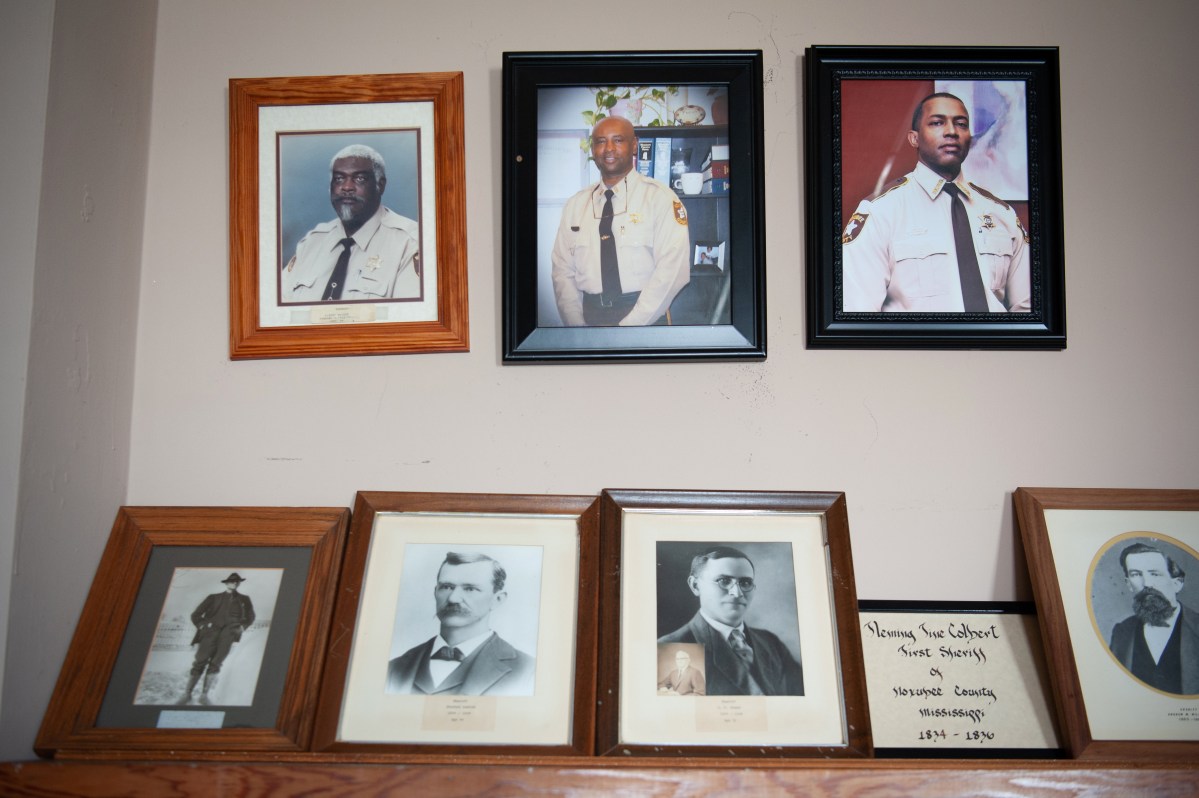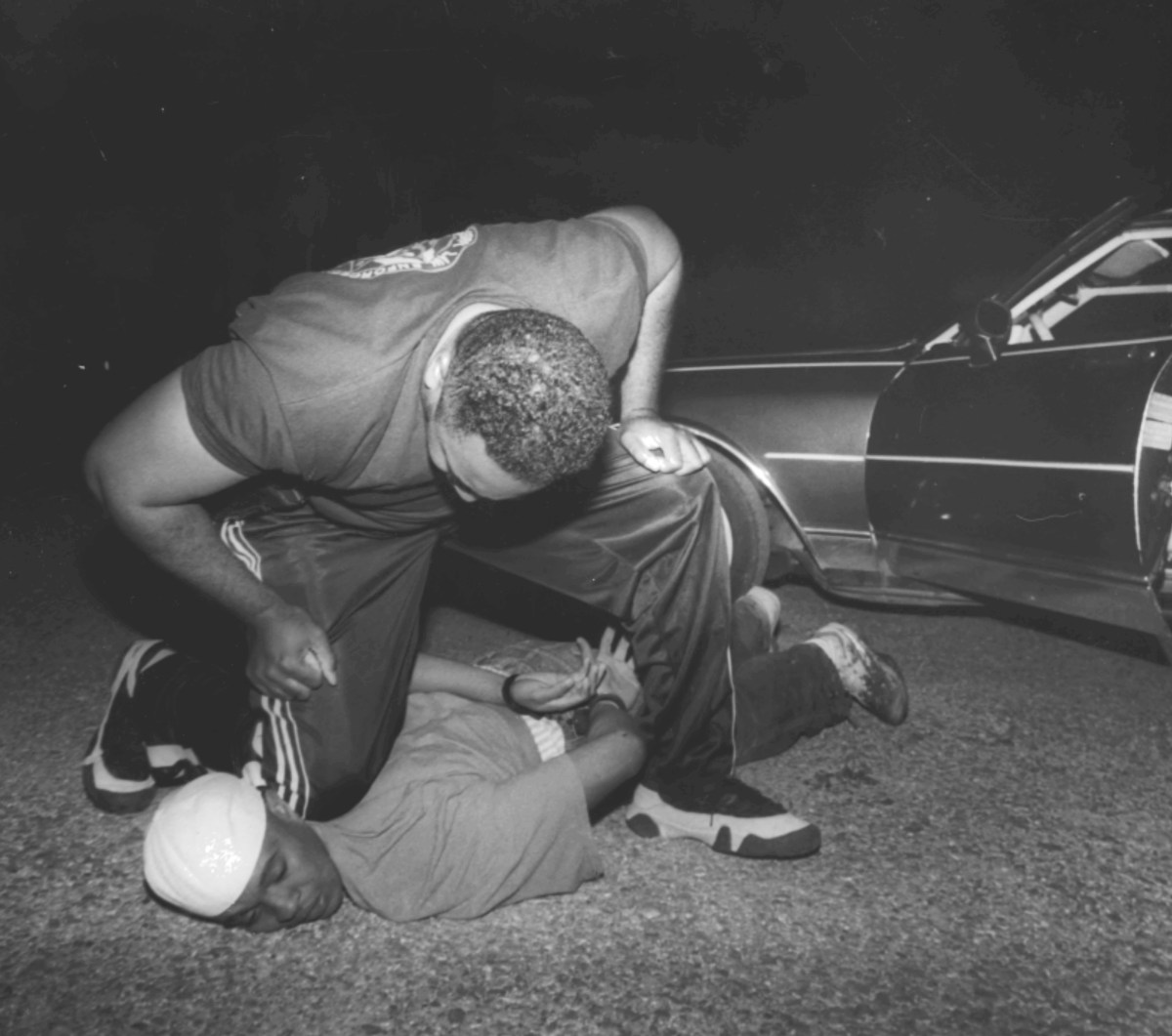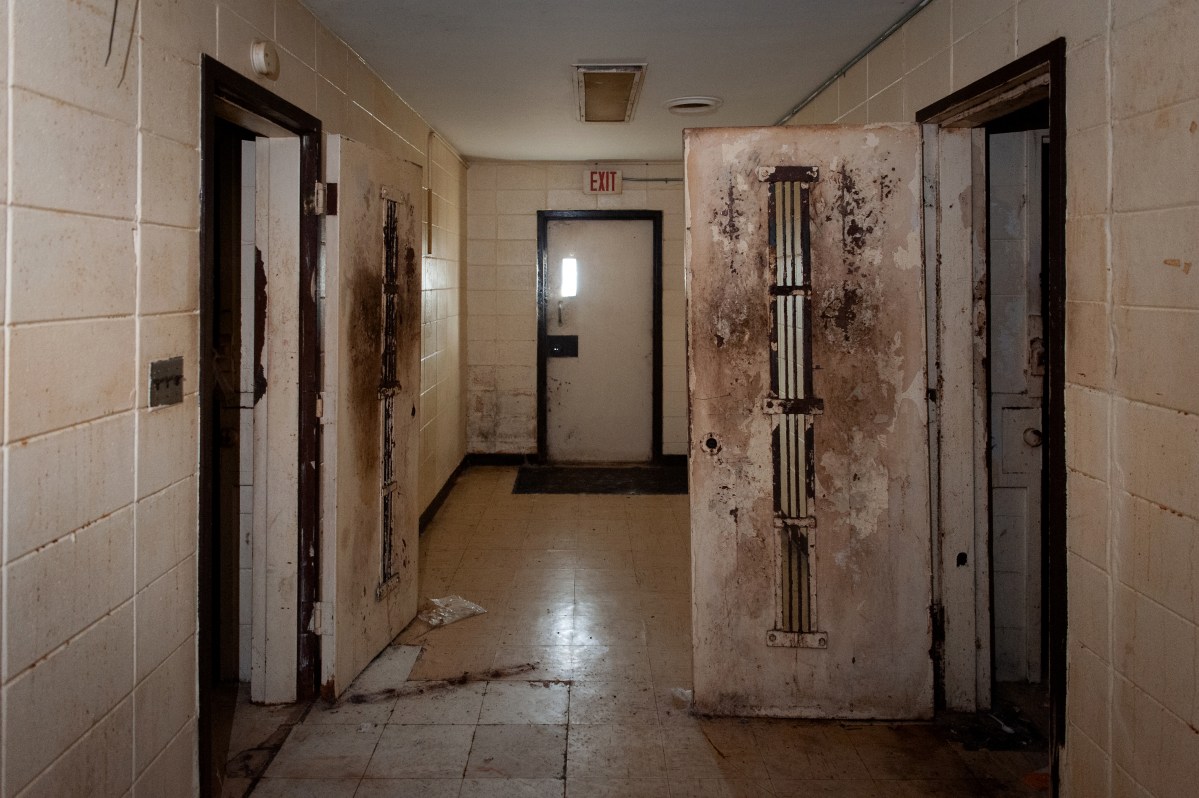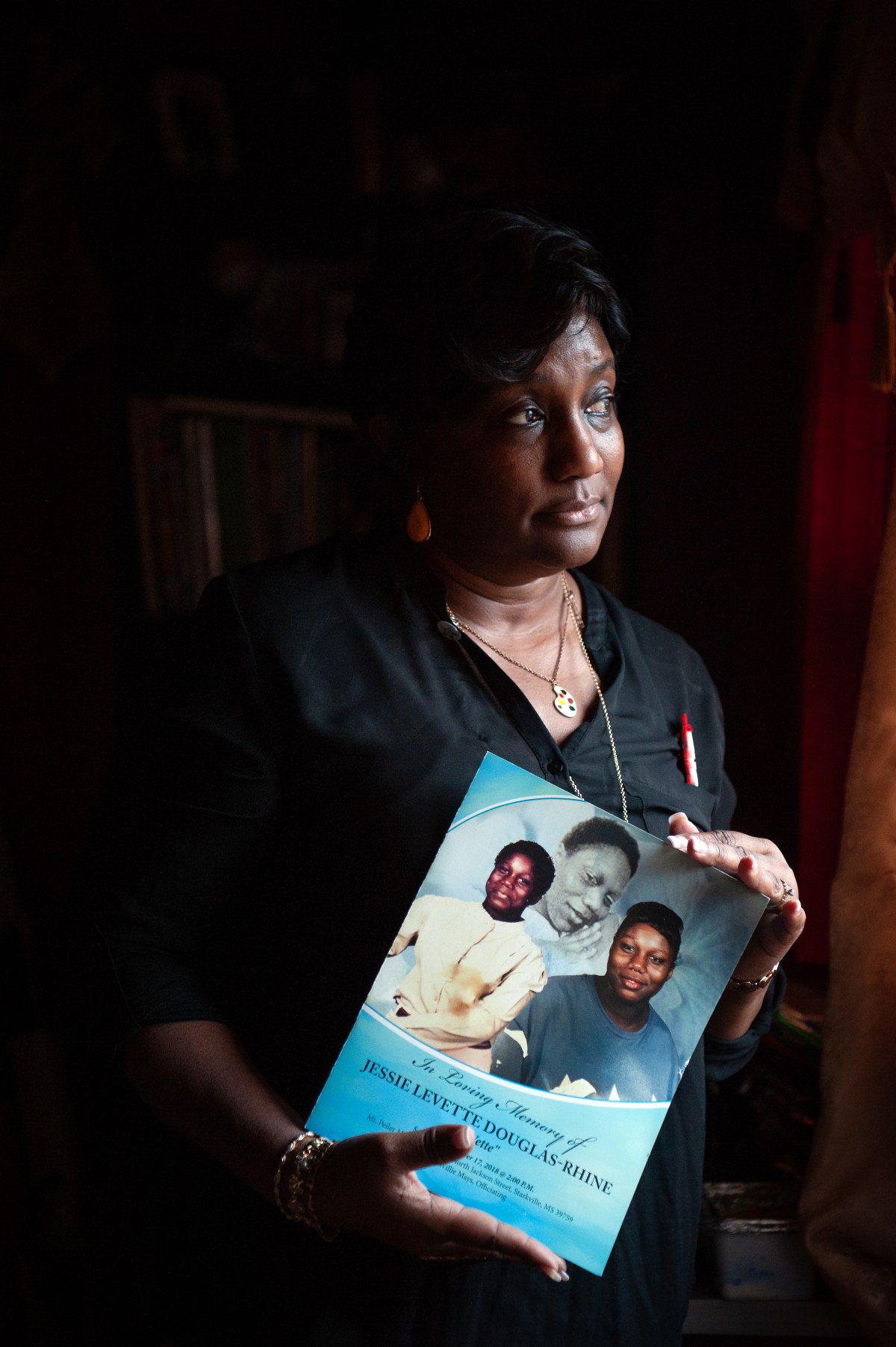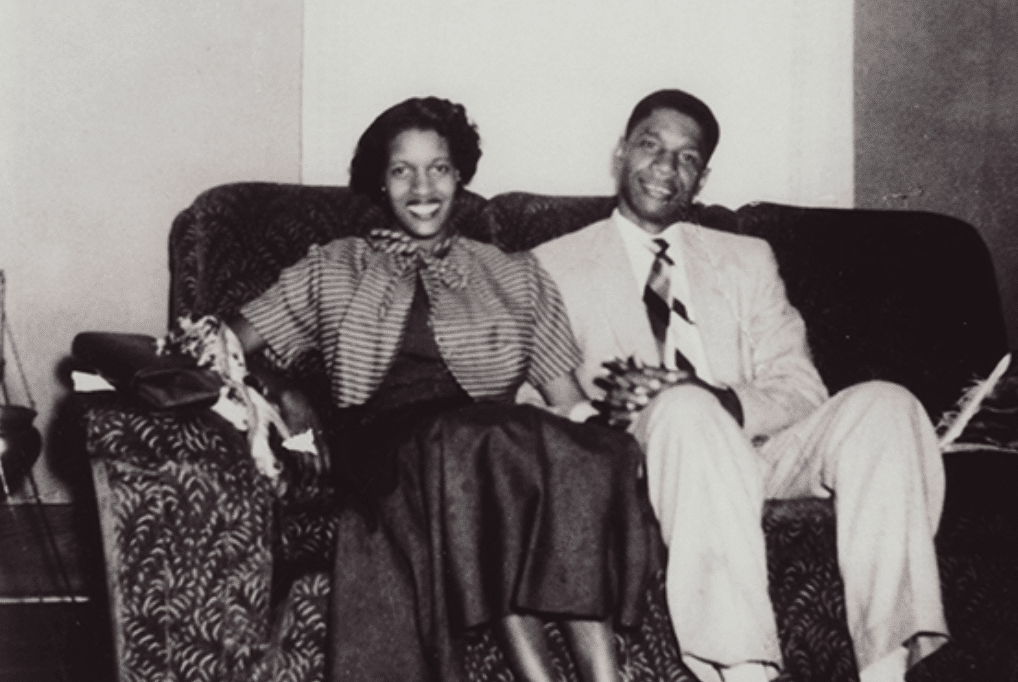Mississippi Today
Sex Abuse, Beatings and an Untouchable Mississippi Sheriff
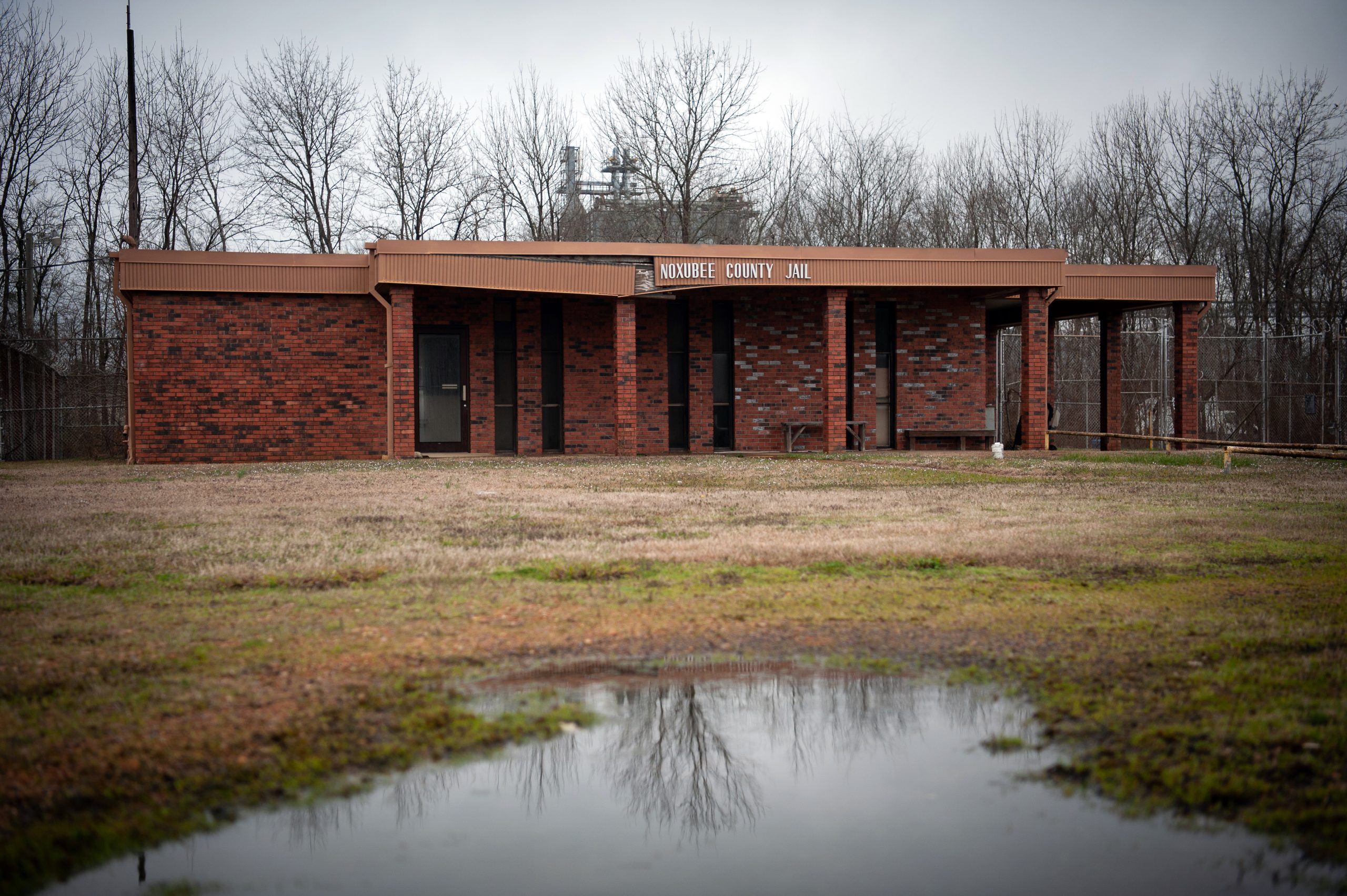
Sex Abuse, Beatings and an Untouchable Mississippi Sheriff
Terry Grassaree was dogged for years by questions about how he did his job as a law enforcement officer in Macon, Miss., a tiny, rural town near the state's eastern border.
There were allegations of rape inside the jail that Mr. Grassaree supervised, and lawsuits claiming that he covered up the episodes. At least five people, including one of his fellow deputies, accused him of beating others or choking them with a police baton.
Mr. Grassaree survived it all, rising in the ranks of the Noxubee County Sheriff's Department, from a deputy mopping floors, to chief deputy, to the elected position of sheriff, making him one of the most powerful figures in town.
Now, more than three years after losing an election and retiring, and 16 years after a woman first claimed that Mr. Grassaree pressured her to lie about being raped, the former sheriff faces criminal charges.
A federal indictment filed in October accuses him of committing bribery in 2019, near the end of his eight-year tenure as sheriff, and of lying to federal agents when they questioned him about whether he requested sexually explicit photographs and videos from a female inmate. Mr. Grassaree has denied the charges and pleaded not guilty.
But an investigation by the Mississippi Center for Investigative Reportingat Mississippi Todayand The New York Times reveals that allegations of wrongdoing against Mr. Grassaree have been far more wide-ranging and serious than those federal charges suggest. The investigation included a review of nearly two decades of lawsuit depositions and a previously undisclosed report by the Mississippi Bureau of Investigation.
At a minimum, the documents detail gross mismanagement at the Noxubee County jail that repeatedly put female inmates in harm's way. At worst, they tell the story of a sheriff who operated with impunity, even as he was accused of abusing the people in his custody, turning a blind eye to women who were raped and trying to cover it up when caught.
Over nearly two decades, as allegations mounted and Noxubee County's insurance company paid to settle lawsuits against Mr. Grassaree, state prosecutors brought no charges against him or others accused of abuses in the jail. A federal investigation dragged on for years, and led to charges last fall, a few weeks after reporters started asking authorities about the case.
Even now, no higher authority has reviewed how Mr. Grassaree ran the jail or whether his policies endangered women, because in Mississippi, as in many states, rural sheriffs are left largely to police themselves and their jails.
In 2006, after Mr. Grassaree and his staff left jail cell keys hanging openly on a wall, male inmates opened the doors to the cell of two women inmates and raped them, according to statements the women gave to state investigators. One of the women said Mr. Grassaree pressured her to sign a false statement to cover up the crimes, according to the state police report that has never been made public.
About a year later, in a lawsuit, four people who had been arrested gave sworn statements accusing Mr. Grassaree of violence. Two of the people said he choked or beat them while they were in his custody. A third said he pinned her against a wall and threatened to let a male inmate rape her.
In 2019, a jailed woman told investigators that she had been coerced into having sex with two deputies who offered her a cellphone in exchange for her compliance. Instead of punishing the deputies, she claimed in a lawsuit against the county, Mr. Grassaree demanded that she send him explicit pictures and videos of herself. The federal indictment also accuses Mr. Grassaree of using his cellphone to facilitate a bribe, which experts say could have been the perks the woman says she received.
All told, at least eight men — including four deputies and Mr. Grassaree himself — have been accused of sex abuse by women inmates who were being held in the Noxubee County jail while Mr. Grassaree was in charge.
Over the years, the accusations of rape and other misconduct at the jail have been investigated separately by the FBI, the Department of Justice and the Mississippi Bureau of Investigation. No rape or assault charges have been filed.
Mr. Grassaree has denied all of the allegations against him and has faced no disciplinary action. His lawyer declined to comment further.
Holding people accountable for rapes and assaults behind bars is difficult under the best of circumstances. There is little to protect incarcerated victims and witnesses from retaliation for speaking up. When they do come forward, they are often dismissed as not credible, especially if the person accused is a law enforcement officer.
What happened inside the Noxubee jail, and how the authorities responded, is a case study in how those difficulties can be even harder to surmount in rural places, where jails are the exclusive domain of a county sheriff who operates largely without oversight.
No state agency oversees Mississippi's county jails, and no state regulator has the authority to fine a sheriff for endangering people in custody or for failing to train the staff who operate the jail. In 2017, state lawmakers stopped providing funds for jail inspections by the Mississippi Department of Health, removing even the basic requirement that the facilities meet food safety and cleanliness requirements.
“They are closed-off institutions, and the people held inside them are unpopular and politically powerless,” said David Fathi, director of the American Civil Liberties Union National Prison Project. “That makes them ripe for neglect and abuse that is entirely foreseeable.”
Scott Colom, the elected district attorney for Noxubee County, took office in 2016 and was not involved in the investigation of the 2006 rape allegations.
After learning of the more recent allegations against Mr. Grassaree and his deputies, Mr. Colom said, he notified federal authorities and worked with them on an investigation. Although he believed the evidence against Mr. Grassaree in the case was “clear and strong,” Mr. Colom said he knew it would be tough to seat an impartial jury in Noxubee County. He has twice been forced to cancel criminal trials because there were too few potential jurors available, he said, and neither of those cases involved a public official.
Darren J. LaMarca, U.S. attorney for the Southern District of Mississippi, declined to comment on the case and so did others responsible for investigating the alleged abuses in the Noxubee County jail.
Mr. Grassaree spoke briefly in an interview about his professional history, but would not answer detailed questions about the 2006 rape cases or the more recent allegations related to his federal charges.
Mary Taylor, a retired dispatcher who worked full time at the jail from 1988 to 2017, said in a phone interview that in her years at the jail she never witnessed any sexual abuse.
She said she wasn't working on the day the two women said the rapes took place in 2006, but that she doesn't believe their version of events.
“My belief? They weren't raped,” Ms. Taylor said. “They did that to get out of jail.”
She maintained that it's “impossible for one man to rape a woman, unless she's not moving, unless it's a Bill Cosby thing.”
“They could have yelled out and told somebody,” she said. “You can't rape the unwilling.”

Building a tough reputation
When Terry Grassaree was born in Macon in 1962, the idea that he could one day be sheriff seemed far-fetched.
In Macon, which briefly served as Mississippi's capital during the Civil War, only white men worked as law enforcement officers in those days. The county had a long history of violence against African Americans, including the massacre of 13 Black Mississippians at a church, gunned down by nightriders on a single August night in 1871. The sheriff at the time arrested no one.
Though the county's population is mostly Black, every sheriff elected in Noxubee County was white until 1988, when Albert Walker became the first Black man to hold the office. Mr. Grassaree, his handpicked successor, was the second.
Mr. Grassaree started his law enforcement career as a police officer in Macon and in nearby Brooksville, and sold insurance on the side to help make ends meet. Sheriff Walker hired him as a county deputy in 1992 and put him to work mopping floors, among other duties, at the county jail. Mr. Grassaree was also a deputy coroner, paid $85 for each body he handled.
He worked his way up to chief deputy, and took on running the jail.
Mr. Grassaree, known to keep order by issuing physical threats, said in an interview last year that he drew inspiration from the professional wrestler “Stone Cold” Steve Austin.
“Even while they were whipping him, he was still the toughest guy on the mat,” Mr. Grassaree said. “He's like, ‘Is that all you've got?' No matter how long a man whips you, he will get tired. He might think he's winning. The only thing you've got to do is hold out.”
This idea, he said, became the foundation for how he behaved when he put on his uniform.
Early in his career, he beefed his 6-foot-2 frame up to 230 pounds, and people started calling him “Big Dog.” Not many people crossed him after that, he said.
His reputation for being aggressive spread across town. In a 2006 letter to the editor in the local paper, a mother complained that Mr. Grassaree had threatened her 16-year-old son. The boy, she wrote, had fought with Mr. Grassaree's son at school.
The editor of the same newspaper, The Macon Beacon, arrived to cover an arrest near a nightclub in 2000 and snapped a picture of Mr. Grassaree kneeling on a man's neck. The photo made the front page.
People who passed through the jail describe being attacked by Mr. Grassaree when he thought they were causing trouble. Four people gave sworn statements about such attacks as part of a 2005 lawsuit against Mr. Grassaree and Noxubee County filed by former deputy Kendrick Slaughter. In the lawsuit, Mr. Slaughter claimed that Mr. Grassaree tried to bribe him not to run for City Council, and then hauled him to jail for talking to the FBI about the alleged bribe.
Noxubee County's insurance company settled the suit for an undisclosed amount.
The four sworn statements accuse Mr. Grassaree of a number of violent acts, which he has denied committing. One man wrote that while he was handcuffed in a courtroom in 2002, Mr. Grassaree beat him until a judge came off the bench to rescue him.
Another man said in his sworn statement that Mr. Grassaree choked him with his nightstick and warned him to follow his orders. The man said Mr. Grassaree told him, “I'll shoot you in the head! I'm the Big Dog! I'm Number One! This my jail!”
A 19-year-old woman said Mr. Grassaree hit her twice with his nightstick and threw her against a wall after accusing her of stealing potato chips from a man held in jail. Mr. Grassaree “spread my legs apart with his foot,” she said in her deposition.
Then, she said, he told her that he ought to let the inmate rape her.
A jail with no rules
The jail that Mr. Grassaree oversaw for most of his career sits frozen in time on Industrial Road on the outskirts of Macon, next to the old Purina pet food mill that now produces feed for catfish farms.
The building has been locked and empty since about 2014, when Mr. Grassaree and his deputies packed up and moved to a new facility down the street. Inside the old jail, a blackened mix of dirt, rust and mold has crept over the white iron cell doors. Bags of trash and dusty bed linens litter the remaining furniture and the floor.
When Mr. Grassaree was put in charge of this building in the 1990s, he inherited a jailhouse that essentially operated without rules. Jail workers allowed inmates to come and go from the building without logging the inmates' movements or supervising them closely.
The onlypolicies about the jail that appear in the 2003 Noxubee County Sheriff's Policy Manual center on the use of force. None tell how to run the jail.
For years, certain inmates were let out of their cells to help cook, pass out food trays and clean.
Kennedy Brewer, who entered the jail in 2002, was one of the facility's most trusted inmates. Eyebrows were raised when he showed up at a court hearing on his own, having driven himself to the courthouse without a deputy to escort him, according to Forrest Allgood, the district attorney at the time.
Mr. Brewer spent five years at the jail waiting to be retried after DNA evidence proved he had been wrongly convicted of sexually abusing and murdering a 3-year-old girl. When prosecutors gave up on a new trial, Mr. Brewer was released, and his case was featured in the Netflix documentary series “The Innocence Files.”
Testifying under oath as a witness in a lawsuit in 2007, Mr. Brewer said he served as a jail trusty, or an inmate with special privileges, and had access to keys that opened each cell. He said he would check newly arrested people into the jail and that he once escorted an inmate to a cell with no one else present.
Mr. Grassaree has denied that inmates were allowed to use jail keys without supervision.
On a June day in 2006, Mr. Brewer had no problem getting into the women's cell block undetected.
He grabbed the jailer's keys off the nail hanging on the wall and slipped down the short hallway that ran the length of jail. In a building smaller than a McDonald's, he and a fellow inmate didn't have to go far. There were no guards patrolling the halls and no surveillance cameras to catch any movements.
When Mr. Brewer unlocked the cell door, one of the women inside was laying down for a nap.
Then Brewer was on top of her, grabbing her arms and forcing her down, according to statements the first woman later gave to state agents.
“No, I don't want to do this,” she begged, according to her statements.
Then she looked for her cellmate, Jessie Levette Douglas. She told investigators she saw another inmate, Laterris Goodwin, on top of her.
It was all over in moments.
The woman who originally reported the rapes declined to be interviewed for this article. Ms. Douglas died of renal failure in a state prison in 2018.
When investigators interview rape victims, they are supposed to remain impartial. But when Mr. Grassaree, who was chief deputy at the time, found the woman crying on the floor, he stood over her and shouted, the woman said in a deposition taken as part of her subsequent lawsuit against the county. He and another member of the sheriff's office yelled that she couldn't tell anybody about the rape and that she was “going to make them lose their jobs and make the department look bad,” according to her sworn statement.
“They kept berating me as if I had done something wrong,” she said.
When state agents arrived the next day at the request of the sheriff's office, Mr. Grassaree handed them everything they needed to dismiss the allegations, including signed statements from two of the men saying the women had invited them to have sex, and more important, a statement from Ms. Douglas saying everything she saw and experienced was consensual.
If Mr. Grassaree and his deputies had been in charge of the investigation, it might have ended there. But when state agents interviewed Ms. Douglas, her story changed.
She told investigators that she and her cellmate had been raped that day and that she lied in her first statement because Mr. Grassaree had pressured her to cover up what happened.
Mr. Grassaree “told me to tell everybody the sex was consensual and that for me to ‘help a brother,' referring to Brewer,”Ms. Douglaswrote in a later statement. “He told me to tell everybody that we put on a freak show for the male inmates.”
In reality, Ms. Douglas told the agents, three men incarcerated at the jail — Mr. Brewer, Mr. Goodwin and Michael Slaughter — had entered her locked cell at different times on the same day and had raped her.
In statements to investigators, Mr. Slaughter, Mr. Brewer and Mr. Goodwin denied that they had raped the women, claiming that the sex was consensual.
In an interview from 2022, Mr. Brewerdenied ever having sex with anyone inside the jail. Neither Mr. Slaughter nor Mr. Goodwin could be reached for comment.
Both women were given polygraph tests, and the examiner concluded that they were telling the truth, according to state investigators' records. Mr. Goodwin and Mr. Slaughter failed polygraph tests; Mr. Brewer declined to take one.
State agents shared their findings with federal and state prosecutors, and the case was presented to a Noxubee County grand jury. The grand jury decided not to issue charges.
Legal experts say Mr. Grassaree could have been investigated for obstructing justice in the case. That never happened, and neither did an investigation of practices in the jail, where agents concluded that four rapes had taken place.
Noxubee County's insurance company settled the woman's lawsuit in 2009. The Macon Beacon reported that she was paid $375,000.
Sabrina Campbell said her sister, Ms. Douglas — the woman who said she was raped by three inmates and who died many years later — wanted the public to know what happened to her. “I don't want my sister to have died in vain,” Ms. Campbell said.
The rapes devastated her sister, who never stopped battling nightmares afterward, she said. “She was scared all the time. She would tell nieces and nephews about the jail, ‘Don't ever come here, because your life is over.'”
Another round of allegations
Allegations of sexual abuse at the Noxubee County jail did not end with the 2006 case.
In 2020, Elizabeth Layne Reed,a woman incarcerated at the jail, made explosive allegations against the men she encountered there. In a lawsuit she filed that year, she accused two deputies, Vance Phillips and Damon Clark, of coercing her into having sex.
She said the men gave her a cellphone and other perks so that she would have sexual encounters with them in remote spots around the jail or when the deputies checked her out of the facility. The deputies even put a sofa in her jail cell, she said.
Ms. Reed said in an interview that she wanted the public to know what happened to her in the hope that others would come forward. “It made me terrified to trust anybody,” she said. “Women in jail and prison need to be protected.”
According to her lawsuit, Mr. Grassaree knew all about his deputies' “sexual contacts and shenanigans,” but did nothing to “stop the coerced sexual relationships.” Mr. Grassaree denied any knowledge of what deputies were doing. “Are you a boss?” he said. “Do your employees tell you everything they do?”
Instead of intervening, the lawsuit alleged, the sheriff “sexted” her and demanded that she use the phone the deputies had given her to send him “a continuous stream of explicit videos, photographs and texts” while she was in jail. She also alleged in the lawsuit that Mr. Grassaree touched her in a “sexual manner.”
The lawsuit was settled for an undisclosed amount.
News outlets in Mississippi made brief mention of the lawsuit, but government officials at all levels, including federal and state prosecutors, were silent for two years about what, if anything, they were doing to investigate the allegations it raised, and whether they had found evidence to support them.
A review by the Mississippi Center for Investigative Reporting and The New York Times of documents filed in the lawsuit, along with documents fromthe preceding2019 state investigation, reveals that Ms. Reedaccused other deputies besides Mr. Phillips and Mr. Clark of sexual harassment and abuse. None of the other deputies has been charged or named publicly. It is unclear whether the FBI investigated those allegations.
The federal bureau's investigation into Mr. Grassaree, Mr. Phillips and Mr. Clark took more than two years to yield charges, even though investigators had confessions of sexual contact from the deputies as well as text messages between the woman and the three men. In fall of 2022, several weeks after reporters began asking authorities about the case, Mr. LaMarca successfully sought indictments against Mr. Grassaree and Mr. Phillips on bribery charges. Mr. Clark has not been indicted.
Ms. Reed hoped that other deputies, including Mr. Clark, would be held accountable, she said. “They're still walking around free, not worried about any charges.”
Ms. Reed said that she felt sick to her stomach when she found out that neither Mr. Grassaree nor Mr. Phillips had been directly charged in connection with her allegations of sex abuse. Lawyers for Mr. Phillips did not immediately respond to requests for comment. Mr. Clark could not be reached for comment.
The indictments do not mention sexual abuse. Along with bribery, Mr. Grassaree was also charged with lying to the F.B.I. in denying that he had “requested and received” nude photos and videos from Ms. Reed. A trial is scheduled for summer.
Julie Abbate, who served as the deputy chief of the Justice Department's Civil Rights Division from 2003 to 2018 and reviewed the allegations at the news organizations' request, said the federal prosecutors could have explored criminal charges against Mr. Grassaree and his deputies for violating the civil rights of women in his facility.
The question of whether to bring federal charges in the case may have been complicated by guidance the Department of Justice issued in 2018, saying that law enforcement officers cannot be federally prosecuted for violating a person's civil rights if the person “truly made a voluntary decision as to what she wanted to do with her body,” particularly if she received a benefit or special treatment in exchange for sex.
But Ms. Reed's decisions in the episode in the Noxubee County jail were “not free-will choices,” said Andrea Armstrong, a law professor at Loyola University, and the cellphone Ms. Reed received from deputies “was the vehicle by which more abuse could be directed towards her.”
Mississippi law makes it a crime for law enforcement officers to engage in sexual acts with incarcerated people. Prosecutors are not required to prove the victims were physically overpowered or even that they told their abuser to stop.
But the district attorney's office that handles criminal cases in Noxubee County chose to pass the 2020case on to federal prosecutors, instead of seeking charges under the state law, because of worries about getting a fair jury in the county. When asked about federal prosecutors' decision to charge Mr. Grassaree and Mr. Phillips with bribery in the case, the district attorney, Mr. Colom, said, “I trust federal authorities to use the best statutes.”
Ms. Abbate said the allegations about abuses in the Noxubee County jail were indicative of a larger, pervasive problem at the facility and a harmful culture inside the sheriff's office. That culture, she said, undoubtedly endangered inmates and allowed abuses to continue.
“The allegations that come to light are almost always just the tip of the iceberg,” said Ms. Abbate, who is now director of Just Detention International, an organization dedicated to ending sexual abuse in correctional facilities. Referring to the 2006 and 2020 cases, she said, “I guarantee you that these two instances are not the only ones.”
This article was co-reported by The New York Times and the Mississippi Center for Investigative Reporting at Mississippi Today.
This article first appeared on Mississippi Today and is republished here under a Creative Commons license.
Mississippi Today
On this day in 1850


May 3, 1850

Shadrach Minkins, already separated from his family, escaped from the Norfolk, Virginia, home, where he was enslaved. He made his way to Boston, where he did odd jobs until he began working as a waiter at Taft's Cornhill Coffee House.
Months later, Congress passed the Fugitive Slave Act, which gave authorities the power to go into free states and arrest Black Americans who had escaped slavery.
A slave catcher named John Caphart arrived in Boston, with papers for Minkins. While serving breakfast at the coffee house, federal authorities arrested Minkins.
Several local lawyers, including Robert Morris, volunteered to represent him. Three days later, a group of abolitionists, led by African-American abolitionist Lewis Hayden, broke into the Boston courthouse and rescued a surprised Minkins.
“The rescuers headed north along Court Street, 200 or more following like the tail of a comet,” author Gary Collison wrote. They guided him across the Charles River to the Cambridge home of the Rev. Joseph C. Lovejoy, whose brother, Elijah, had been lynched by a pro-slavery mob in Illinois in 1837.
Another Black leader, John J. Smith, helped Minkins get a wagon with horses, and from Cambridge, Hayden, Smith and Minkins traveled to Concord, where Minkins stayed with the Bigelow family, which guided him to the Underground Railroad, making his way to Montreal, spending the rest of his life in Canada as a free man.
Abolitionists cheered his escape, and President Millard Fillmore fumed. Morris, Hayden and others were charged, but sympathetic juries acquitted them. Meanwhile in Montreal, Minkins met fellow fugitives, married, had four children and continued to work as a waiter before operating his own restaurants.
He ended his career running a barbershop before dying in 1875. A play performed in Boston in 2016 told the dramatic story of his escape.
This article first appeared on Mississippi Today and is republished here under a Creative Commons license.
Did you miss our previous article…
https://www.biloxinewsevents.com/?p=355311
Mississippi Today
Medgar Evers will receive Presidential Medal of Freedom

At her husband's funeral in 1963, Myrlie Evers heard NAACP Executive Director Roy Wilkins declare, “Medgar Evers believed in his country. It remains to be seen if his country believes in him.”
Later today, his country will declare its belief in him when the family of the slain Mississippi NAACP leader receives the Presidential Medal of Freedom, the highest civilian honor.
But Medgar Evers was more than a civilian. He fought the Nazis in World War II, only to return home and fight racism, this time in the form of Jim Crow, which barred Black Mississippians from the ballot box.
On his 21st birthday, he and other Black veterans of the war went to vote at the courthouse in Decatur, where they were met by white men with guns.
Afterward, he vowed he would never be defeated again and that he would keep fighting by joining others dedicated to the cause of the civil rights movement.
“The movement for equality was always on his mind, and whites' denial of his right to vote in his hometown served as one cog of many in the overall wheel of injustice, a wheel of which he was bound and determined to break,” said Michael Vinson Williams, author of “Medgar Evers: Mississippi Martyr.”
Myrlie Beasley met Medgar Evers on the first day of her freshman year at Alcorn A&M College in fall 1950. As she leaned against a light pole, she said he told her to be careful, “you might get shocked.”
And shocked she was when she fell in love and married him a year later. He was one of those military veterans that her family had warned her about. And he was involved in the movement that her family had avoided.
She joined him in the fight, and they moved to Mississippi's only all-Black town, Mound Bayou, where he helped Dr. T.R.M. Howard lead a boycott. They distributed thousands of fluorescent bumper stickers that read, “Don't Buy Gas Where You Can't Use the Restroom.”
In January 1954, the University of Mississippi School of Law turned Medgar Evers away because of the color of his skin. NAACP officials considered taking his case to court, but they were so impressed with him they hired him instead as the first field secretary for the Mississippi NAACP.
Myrlie Evers worked as his secretary. She said he insisted they call each other “Mr. Evers” and “Mrs. Evers” in the office.
He spent much of his time on the road, putting 40,000 miles a year on his car, recruiting new members, reviving branches and inspiring young people to participate in the movement, including Joyce Ladner, who invited him to speak to the NAACP Youth Council in Hattiesburg.
“He had a quiet courage,” she recalled. “I was always amazed that he drove up and down Mississippi's two-lane highways alone at night. He was a marked man, but he kept on going.”

In 1961, Joan Trumpaeur Mulholland was one of more than 400 Freedom Riders, half of them white, who challenged segregation laws in the South. She and other Riders were arrested and sent to serve their time at the State Penitentiary at Parchman.
When she and other Riders needed a lawyer, Medgar Evers “was the one who took care of it,” she said.
He became a model for her and others in character and courage, talking often to Tougaloo College students, she recalled. “He wasn't intimidated.”
In 1962, Evers installed Leslie McLemore as president of the Rust College chapter of the Mississippi NAACP. “Medgar Evers was really a brilliant man,” he said. “He had an incisive mind and personality that drew people to him. In another era, he could have been a U.S. senator from Mississippi or maybe even President.”
Evers investigated countless cases of intimidation and violence against Black Americans, including the 1955 murder of Emmett Till. Evers often dressed as a sharecropper in those investigations.
No matter where he went, threats of violence followed. He bought an Oldsmobile 88 with a V-8 engine so powerful it would leave most cars behind. On some dark nights across the Mississippi Delta, he floored it to escape those hell-bent on harming him.
His name appeared on Ku Klux Klan “death lists,” and his home telephone rang at all hours with threats to him and his family.
When his daughter, Reena, answered the phone one time, she heard a man saying he planned to torture and kill her father.
In spite of these threats, he stayed. He told Ebony magazine, “The state is beautiful, it is home, I love it here. A man's state is like his house. If it has defects, he tries to remedy them. That's what my job is here.”
On May 20, 1963, Evers talked on television about the mistreatment of Black Mississippians. “If I die, it will be a good cause,” he told The New York Times. “I'm fighting for America just as much as the soldiers in Vietnam.”
Weeks later, President Kennedy delivered his first and only civil rights speech, telling the millions watching on television, “If an American, because his skin is dark, cannot eat lunch in a restaurant open to the public, if he cannot send his children to the best public school available, if he cannot vote for the public officials who will represent him, if, in short, he cannot enjoy the full and free life which all of us want, then who among us would be content to have the color of his skin changed and stand in his place?”
Evers smiled. He and other Black leaders had urged Kennedy to push Congress for a civil rights bill, and now that seemed certain to happen.
Hours later, returning home from a late civil rights meeting, Evers was shot in the back in the driveway of his Jackson home.
Myrlie Evers and their three children dashed outside, saw the blood and screamed. “Daddy!” Reena yelled. “Please get up, Daddy.”
He never did.
“He had the courage to hold an impossible job at a crucial turning point in American history,” said Taylor Branch, the Pulitzer Prize-winning author of a trilogy on the civil rights movement.
For the first time, members of the mainstream press didn't call such a killing “a lynching,” he said. “They called it an assassination.”
In his book, “Parting the Waters,” he wrote, “White people who had never heard of Medgar Evers spoke his name over and over, as though the words themselves had the ring of legend. It seemed fitting that the casket was placed on a slow train through the South, bound for Washington so that the body could lie in state.”
After the casket arrived, Medgar Evers was buried with full military honors at Arlington National Cemetery.
“The tragedy of his martyrdom is eloquent testimony to the courage and dedication of a leader who — in his lifetime — deserved the respect and support of the powerful people who later publicly identified with this man and his cause,” said John Dittmer, author of “Local People: The Struggle for Civil Rights in Mississippi.” “Though long overdue, this award is a fitting tribute to Medgar Evers and his family.”
A year after Evers' assassination, Congress passed the Civil Rights Act on his birthday, and President Lyndon B. Johnson signed the bill into law hours later.
“Medgar Wiley Evers boldly stood against injustice, against oppression, against this country's determination to keep Black people as second-class citizens,” Williams said, “and he was murdered because of his commitment to truth, justice and the struggle for civil and human rights.”
Before leaving office as governor in 1984, William Winter hosted Myrlie Evers and her family at the mansion, where he remarked that Medgar Evers did more than just free Black Mississippians, he freed white Mississippians as well from the bonds of racial segregation, oppression and hate, he said. “We were all prisoners of that system.”
It took three decades before Evers' killer was finally brought to justice in 1994, and that verdict helped to inspire the reopenings of other cases. There have been 24 convictions in civil rights cold cases.
Myrlie Evers' courage to press for justice in her husband's case started all of this, said Leslie McLemore, who helped found the Fannie Lou Hamer National Institute on Citizenship and Democracy. “It would not have happened without her persistence.”
When she learned last week about the Presidential Medal of Freedom honoring her late husband, she exclaimed to her daughter, Reena Evers-Everette, “Oh, my God!”
Then Myrlie Evers grew silent.
“I'm just utterly speechless,” she said, “and frozen with gratitude.”
Evers-Everette still misses the man she knows as “Daddy,” but she perseveres as the executive director for the Medgar and Myrlie Evers Institute, because his spirit inspires her.
“I feel him around me all the time,” she said. “I marvel at his courage, stamina, vision, and commitment for equality and justice for his people and all of humanity. I pray for his love and wisdom as I pursue this work, because I don't want him to have died in vain.”
This article first appeared on Mississippi Today and is republished here under a Creative Commons license.
Did you miss our previous article…
https://www.biloxinewsevents.com/?p=354725
Mississippi Today
Legislative leaders: Medicaid expansion measure set to die Thursday night
An effort in the Mississippi Legislature to accept billions of dollars in federal money to expand Medicaid coverage to the working poor – a policy which medical experts, clergy and business leaders advocated – was expected to die on a Thursday night deadline, according to House leaders.
House Medicaid Chair Missy McGee, R-Hattiesburg, told reporters that she delivered a proposal to Senate negotiators on Thursday morning that would have allowed voters to have the final say on a statewide referendum in November whether the state should expand Medicaid.
But the Forrest County lawmaker said she had not heard a response from the Senate at all on Thursday, leading her to believe expansion is certain to die by an 8 p.m. Thursday deadline.
“It's disappointing,” McGee said. “We worked really hard on it, and we fought to the bitter end.”
The bill's death would mark an end to months of intense debate at the Capitol and scores of rallies urging legislators to adopt expansion under the federal Affordable Care Act.
For a brief moment on Wednesday, it appeared both chambers at the Capitol might adopt a compromise, but expansion under that proposal contained stipulations the federal government is not likely to approve and could have held expansion here in limbo for years.
House and Senate negotiators on Tuesday night agreed on a compromise that would have expanded Medicaid coverage to individuals who make roughly $20,000 but only if the federal government signed off on a work proposal for recipients – something the federal government was almost certain to reject.
But the deal fell apart after rumors circulated in the Capitol that the Senate did not have enough votes to support the plan and after a large portion of Democrats in the House objected to the work requirement.
House Speaker Jason White, R-West, said he would have had the votes Wednesday in the House to pass the compromise, even with the loss of a significant number of Democratic votes.
But the speaker opted to send the proposal back to negotiations after being told by Senate leaders that the Senate only had 28 votes – not enough to pass it by a needed three-fifths majority.
White said his negotiators offered the referendum option as a compromise that he hoped more Senate Republicans could support. He said he knew it was a long shot that the Senate would accept the proposal, but he thought it was worth a try.
“I am not casting blame,” White said when asked about what he said was the lack of votes in the Senate. “… But I had to act on that information.”
White said he was disappointed that Medicaid expansion did not pass this session, but he said he is glad it was debated and discussed during the session.
“It was a good first step,” he said. “Whether we will look at it next year or the next, I don't know. We will have to reassess.”
White, in his first year as speaker, was the first Republican legislative leader to bring up legislation to enact Medicaid expansion. That original proposal passed by an overwhelming bipartisan vote in the House.
When asked about whether the Senate had the votes to pass the compromise on Wednesday, a spokesperson for Lt. Gov. Delbert Hosemann said, “The Senate was working to secure the votes, but that effort stalled when House Democrats indicated they did not support the bill.”
Democratic leaders in a statement said they have been “crystal clear” about what they were willing to accept in a Medicaid expansion compromise, but whether House Republicans wanted to listen to is “beyond our control.”
“Unfortunately, neither House nor Senate leadership chose to act on the language we proposed,” the statement read. “Instead, we will leave Jackson without a plan to solve our state's increasingly dangerous healthcare crisis.”
If the expansion legislation dies as expected, lawmakers will have to wait until next year during the 2025 session to reconsider the policy that 40 other states have adopted.
Bishop Ronnie Crudup, Sr., the Mid-South Diocese of the Fellowship of International Church who has been advocating for expansion for months at the Capitol, told Mississippi Today he was still hoping the two chambers could reach a “dramatic” last minute compromise.
“But we will continue to advocate for Medicaid expansion,” Cruddup said. “If something dramatic doesn't happen, we will be looking for other routes to make this happen.”
Lawmakers on Thursday said they expect to end the 2024 legislative session early Saturday.
This article first appeared on Mississippi Today and is republished here under a Creative Commons license.
-
Mississippi Today5 days ago
On this day in 1951
-
SuperTalk FM1 day ago
Driver’s education set to become mandatory in Mississippi as bill passes
-
SuperTalk FM4 days ago
Festival merger in Leland sets up one major event for Mississippi Delta
-
Mississippi News6 days ago
One injured in Mississippi officer-involved shooting after chase
-
SuperTalk FM4 days ago
PERS bill set to phase in employer rate increase heads to governor’s desk
-
Mississippi Business3 days ago
Geartek expanding operations in Alcorn County
-
Mississippi News3 days ago
Two women accused of shoplifting across southeast captured in Mississippi
-
SuperTalk FM7 days ago
Investigation underway after gun found in backpack of Ridgeland High School student
